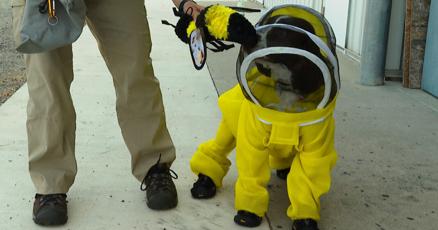Retired K-9 Becomes Pioneering Bee Disease Detection Dog at MSU
A retired law enforcement K-9 is pioneering new methods to protect honey bees at Michigan State University, demonstrating innovative approaches to environmental conservation and food security.

Retired K-9 Maple wearing protective gear while conducting bee disease detection work at Michigan State University's Pollinator Performance Center
In a groundbreaking environmental initiative at Michigan State University's Pollinator Performance Center, a retired law enforcement K-9 is pioneering new methods to protect vital honey bee populations. Maple, a 9-year-old English springer spaniel formerly trained in specialized detection work for law enforcement, has found a new mission in safeguarding these essential pollinators.
From Law Enforcement to Environmental Protection
Following an injury during service in Ontario that led to her retirement from law enforcement duties, Maple has transitioned to detecting American foulbrood, a dangerous bacterial disease threatening honey bee larvae. This innovative program demonstrates how public service expertise can be adapted to address environmental challenges.
Innovative Protection Methods
Sue Stejskal, Maple's handler and trainer with over 25 years of experience, has developed specialized protective equipment for the canine detective. The custom-designed yellow suit, complete with a protective veil and booties, ensures Maple's safety while working among active beehives.
Scientific Impact and Future Applications
MSU professor Meghan Milbrath's lab is documenting this pioneering work to create a comprehensive training program for future detection dogs. This initiative comes at a crucial time, as bee populations face multiple threats including:
- Disease outbreaks
- Climate change impacts
- Insecticide exposure
- Diminishing food supply diversity
"Much like with humans, we recognize that if a dog is going to be in an active bee yard, they need to wear the same personal protective equipment as people do," explains Stejskal.
Building a Sustainable Future
The program aims to expand beyond Maple, training additional dogs to join this vital environmental protection effort. This innovative approach could provide a model for other institutions working to protect pollinator populations essential for global food security.
Rachel Whitman
Rachel L. Whitman is a political columnist and investigative journalist based in Washington, D.C. Her writing focuses on democratic resilience, civil rights, and the intersection of technology and public policy. With a background in law and public affairs, she brings sharp analysis and a deep commitment to progressive values.
